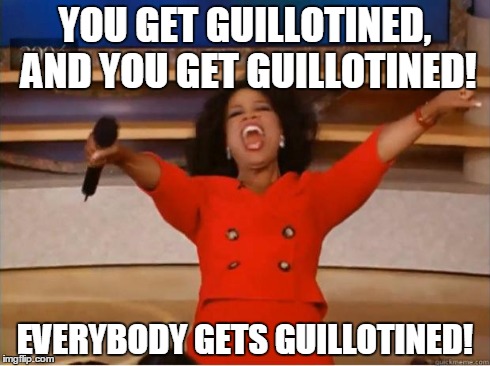Louis XVI was the king of France leading up to the Revolution, so does that mean it was his fault? Not entirely. The people, especially the laboring poor, had been overly taxed and mistreated by the monarchy for centuries. So their resentment towards the monarchy had been building up for a long time. But Louis is definitely not blameless here. This can be evidenced with the way he handled the nobles' request to call the Estates General. They requested to call the General to weigh in on whether the king should be able to pass a tax on properties and assemblies or not. Instead of acquiescing, however, Louis tried to establish the tax by decree, causing protests and public dissent. The story ended when Louis, kicking and screaming, eventually called the General.
This story represents the gradual collapse of the absolute monarchy. Louis wasn't humble enough to initially take the nobles' request into consideration but he wasn't strong enough to hold his ground against the people. In Louis' mind, he had the divine right to rule. It is the Lord's will for him to rule, so it would be going against the word of God to give it up.
Would the same thing have happened if Bonaparte had been the monarch? Bonaparte was stronger than Louis, but he was not humble. He, like Louis, would never have approved the nobles demands to call the Estates General. He would have forced the taxes on the people and not given in. But this would have caused even more resentment towards the monarchy.
One of the main reasons Napoleon was able to get away with his dictatorship was because of his prior reputation as a valiant general for the French army. If he had been a king, he would have carried the ruthless reputation of all of the monarchs before him and the people would never have respected him and revered him. They would have been fed up with him the minute he tried re-organizing the government.
Traditional theories and revisionist historians have their own reasons for why the war happened. They blame it on the economy of the old regime (who had little money to spend on actual France), and the debts from war and extravagance of the court.
Now, would the Reign of Terror have happened without Robespierre? Robespierre saw absolutists everywhere he turned. While he did not cause the revolutionaries to fear the rise of anti-revolutionaries, he definitely fueled their fire. The Reign of Terror most likely would not have been as severe if he was not at the head.
An example of the National Convention's radical actions under Robespierre is the Civil Constitution of the Clergy. This was a loyalty oath to the revolutionary government, which was trying to dilute the long-held power of the Catholic Church. They believed that the church supported the ancient regime ideas of the 3rd estate. This caused the clergy to split, with one side agreeing and the other fleeing from the revolutionary government, cussing them as they left. This also raised resentment against the government and helped lead to its demise.
Thank you for tuning in, the end.














